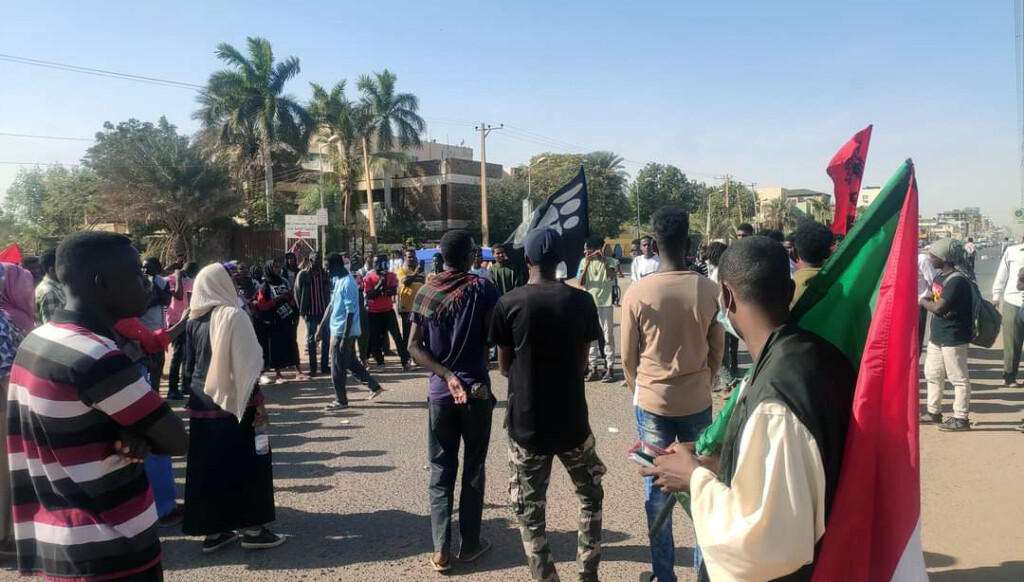Living conditions in Sudan ‘humiliating’

Demo in Khartoum on Thursday (Photo: Supplied)
KHARTOUM –
Living conditions in Sudan are ‘humiliating’, according to participants in the People’s Livelihood Marches of the Millions in the Sudanese capital Khartoum on Thursday.
Members of resistance committees and revolutionary groups stressed the difficult situation that people are currently experiencing “as a result of the policies pursued by the junta, its imposition of higher tuition fees, and large increases of service tariffs and various taxes“.
Siddig El Jaw, member of the Kalakla Resistance Committees in south-west Khartoum, said that the demonstrations on Thursday “are in protest against the difficult living conditions experienced by the people, high cost [of living] and the increase of fees at the state universities.
“The people demand a decent life and an easing of the burdens of living,” he said. “The putschists are not able to provide anything for the country, so they had to increase taxes, and fees for health and transportation tariffs.
“The kezan* [affiliates of the ousted regime of Omar Al Bashir 1989-2019] are still there, stealing the people’s resources,” he explained. “They are still everywhere, including in the current political process.”
The 2021 military coup significantly worsened the situation for many people as Sudan was denied more than $4.4bn in foreign aid, its trade balance deficit nearly tripled, and humanitarian organisations struggle to continue their activities in the country.
As previously reported by Radio Dabanga, Economic analyst Khalid Saad pointed out that “political liquidity” in the country has led to “chaos” in inflation figures and the failure to develop a solid economic policy, he said, warning that “the economy has become extremely fragile.” At the time, a resident in Omdurman told Radio Dabanga: “We all are desperate and afraid of the future. I tell you, Sudan is gone.”
Food insecurity
Humanitarian organisations have highlighted acute food insecurity across Sudan. In reports, the United Nations Office for the Coordination of Humanitarian Affairs (OCHA) asserts that almost a quarter of Sudan’s population (11.7 million people) was estimated to be facing acute food insecurity from June to September last year.
In July, Radio Dabanga explained that Sudan’s poverty and food insecurity rates are likely to be significantly higher than those estimated by the country’s authorities and the United Nations (UN).
Last year, the UN World Food Programme (WFP) in Sudan lamented that due to a funding shortfall of $366 million for 2022, WFP is having to prioritise assistance based on the resources available and “make heart-wrenching decisions, knowing that we cannot help everyone in Sudan who needs it”. Soaring food prices are forcing many destitute displaced people in Darfur to face hunger every day.
Call for justice after rape
The resistance committees in Khartoum organised a protest march to Street 60 to denounce the kidnapping and gang-rape of the daughter of El Tayeb Osman, Secretary General of the suspended Empowerment Removal Committee**.
The participants in the procession raised banners and chanted slogans denouncing the crime, demanding that the perpetrators be brought to justice. Khartoum state police announced the arrest of the main suspect the day after the incident.
* Kezan, or kizan, is a pejorative nickname used by many Sudanese to refer to Islamist loyalists to the regime of Omar Al Bashir (1989-2019) and who enjoyed far-fetching privileges during his rule. The word is the plural of koz which means ‘wooden or iron mug’. The nickname is based on a description the Islamic Brotherhood called themselves, when the founder of the group, the Egyptian Hasan El Banna, said “Religion is a sea, and we are the mugs that draw from it”.
** Empowerment (tamkin) is the term with which the ousted government of Omar Al Bashir supported its affiliates by granting them far-going privileges, including government functions, the setting-up of various companies, and tax exemptions. In the end of 2019, the government of Abdallah Hamdok established the Empowerment Removal Committee (ERC) with the aim to purge the country of the remnants of the Al Bashir regime. The committee’s full name is the Committee for Dismantling the June 30 1989 Regime, Removal of Empowerment and Corruption, and Recovering Public Funds. The work of the ERC was suspended, and a number of its members detained following the October 2021 military coup d’état.











 and then
and then